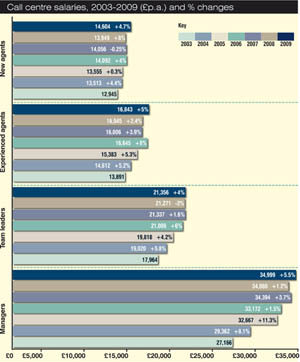
Call centres to recruit more and start spending again as gloom lifts
The brick wall which struck call centres in the last year has started to crumble, says Steve Morrell, of ContactBabel. In this exclusive report for us, he reports on his major new survey

CALL centres expect to recruit more than 10 per cent more agents within the next 12 months. Our survey of over 200 UK call centres shows that, in particular, the IT, insurance, public sector and outsourcing sector expect significant increases in headcount while telecoms and retail are less optimistic.
Respondents expect that 2010 will see a large rebound in agent figures, with an average growth rate in headcount of 10.4 per cent. The general feeling, even in many of the call centres that declined in 2009, is that 2010 is expected to see a return to growth, certainly in headcount and, more tentatively, in IT investment as well.
Among call centres which had reduced staff numbers in the past 12 months, two in five expect an upturn in the next year; just a quarter (27pc) expect a further decline.
It comes after a year in which the call centre industry hit a brick wall with growth in headcount at only 0.2pc. In addition, nearly half (46pc) of respondents cut their operating expenditure and one-third (36pc) reduced capital expenditure. In many cases, investment plans were mothballed until the economy picked up.
In some ways, the call centre industry as a whole has been spared the worst of what has gone on in many businesses. Wholesale redundancies in customer service would have an immediate and negative effect on customer satisfaction and loyalty, with revenues decreasing accordingly. Businesses have generally focused their cost cutting on areas which are not immediately noticeable, such as training or the replacement of IT systems, although this approach stores up problems for the future.
This article draws on our report, the UK Contact Centre Decision-Makers’ Guide, 2009 — see panel for details and reader offer. The report analyses the results from questionnaires completed by 210 call centre managers and directors who have a total of 51,650 agent positions and an average call centre size of 165 agent positions.
Salaries and attrition Against a backdrop of economic gloom and with considerable redundancies across the board, salaries — which represent more than three-quarters of call centre costs — held up surprisingly well.
As respondents to this survey can change from year to year, this year we asked respondents how their own salary patterns had changed in the past year. The answer supported the wider findings that agent salaries had not in general been affected by the economic crisis.
Usually, IT agents tend to be paid the most while those in outsourcing receive the lowest salary. This year, agents in the public sector have overtaken those in IT — by about £300 for those with experience — although agents at outsourcers remain lowest-paid on average.
At a management level, the story is different. Managers in financial services and telecoms and utilities managers are paid the highest and those in public sector are among the lowest this year.
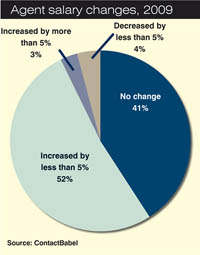
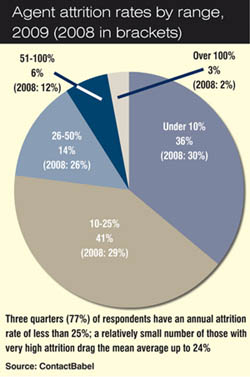
In each of the past five years, staff attrition rates have crept up from the mid-teens to well over 30pc. In 2008, attrition slackened to a mean average of 28pc, with the median — the midpoint of all respondents’ answers — being significantly less, at 20pc. However, this year’s data shows that the economic downturn has not been all bad news, with attrition levels dropping rapidly to a mean average of 24pc.
Annual attrition rates of under 25pc were reported by 77pc of respondents, with a relatively small number of very high attrition operations dragging the mean average up to 24%.
What makes a successful agent? Empathy, the ability to see another’s point of view, is seen as being the most important characteristic of successful contact centre agents. More than half (54pc) of respondents stated that empathy with customers was the No. 1 most important attribute, far outweighing more task-focused abilities such as sales ability or multi-tasking, or even positive behaviours such as reliability and being a team player.
In fact, empathy was rated first, second or third in importance by nearly 90pc of respondents; followed by reliability (61pc) and team working (48pc).
The picture painted of successful agents is that of a versatile, reliable good listener — nothing flashy or highly-strung, nor a simple automaton happy to plod on doing the same thing for hours. Empathy is a characteristic which is hard to learn, and which is ripe for identifying in the recruitment phase through personality testing, for example.
Empathy is important for an agent to display in order to make the caller feel that someone is listening to and understanding them, and that they are trying to solve their issue, rather than just seeing the caller as a nuisance. As such, empathy is vital for improving customer satisfaction and loyalty, cross-selling and up-selling.
Complaints and customer satisfaction UK call centres will handle 700m complaints in 2009. Retail and distribution tops the list this year with 10.5pc of all calls being complaints — last year this sector was second with 7.3pc.
However, our research has found the vast majority of complaints were not about the call centre or its staff, but rather “failure demand” caused by a breakdown of processes elsewhere in the organisation (see table).
Complaints in the IT sector have shown a dramatic drop from 7.3pc to just 1pc while the public sector has more than doubled to 7pc and outsourcers now have nearly three times the proportion of complaints than 2008.
The average percentage of calls, across all markets, which are complaints now stands at 5.4pc, a rise of 1pc. However the percentage that are about the call centre has dropped by 1pc while those about the wider business have risen by the same number.
Although by far the greatest number of complaints is not about the call centre staff, it is the call centre that has to deal with the dirty work. Further failures within the complaints process can see customers calling into the call centre again and again, becoming more irate each time.
There is a real risk, especially in large call centres, that a single agent does not have the capability or responsibility to deal with the customer’s issue. It may reach across various internal departments — such as finance, billing, provisioning and technical support — none of which can or will take responsibility for sorting out the whole problem.
For example, the telecoms & utilities sector receives a high proportion of complaints (7pc of all calls), but 94% of these are actually about the results of failed processes elsewhere in the enterprise. Many telcos are very large, siloed and complex operations, and although the customer may be cursing the contact centre for its inability to deal with the complaint, the real problem lies elsewhere.
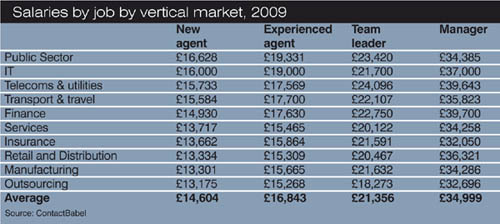
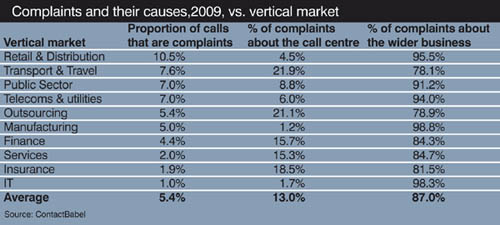
First-call resolution (FCR) Our survey revealed a disturbing trend this year: a 20pc drop in the number of call centres that measure first-call resolution — a worrying three in five of respondents.
The ability to understand a query and deal within a reasonable period at the first time of asking is the key to the success of a call centre. It cuts the overall number of calls while providing the customer with a good experience which will impact on the company’s overall performance.
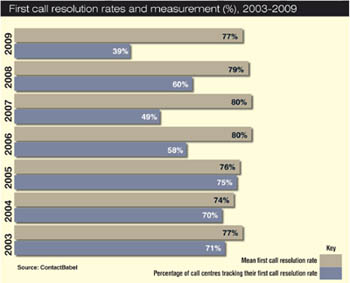 And it
has a positive effect on agent morale — and thus, staff attrition rates — and
increases the chances of successful cross- and up-selling. Although lip service
is paid to the importance of this metric, it can be very problematic to quantify
accurately, risking this metric being ignored, especially as it is not simply a
matter of producing a monthly report from ACD statistics.
And it
has a positive effect on agent morale — and thus, staff attrition rates — and
increases the chances of successful cross- and up-selling. Although lip service
is paid to the importance of this metric, it can be very problematic to quantify
accurately, risking this metric being ignored, especially as it is not simply a
matter of producing a monthly report from ACD statistics.
On average nearly a quarter (23pc) of calls are not resolved first time. Each call has an average handling cost of £3, so a reasonably sized call centre taking 2m calls per year will spend around £1.25m dealing with calls not handled successfully the first time around. This should make first-call resolution a priority for any call centre.
It’s easy to see how dealing with more calls straight away can benefit everyone concerned. So haven’t first-call resolution rates really improved over the past seven years?
They have stayed fairly constant, varying between a low of 74pc in 2004 and highs of 80pc in 2006 and 2007, suggesting that the underlying causes of multiple calls have not been addressed.
Of greater concern is the decrease in the proportion of contact centres tracking this metric. It declined from 70-75pc in 2003-2005 to below 50pc. There was a slight recovery (to 60pc), but the 2009 figure dropped to 39pc — confirming that the overall trend is certainly downwards.
No-one can suggest that this decline in FCR measurement can be caused by first-call resolution becoming less important. Businesses’ focus on customer satisfaction and operational efficiency — both of which directly benefit from an improvement in FCR — has actually increased in recent years.
The answer almost certainly lies in the inability of call centres to measure their first-call resolution rate effectively and thus to do much with it that is commercially meaningful. This is a major challenge for call centres — and a major opportunity for solution providers.
 About the report
About the report
The UK Contact Centre Decision-Makers’ Guide (2009, 7th edition) replaces the UK Contact Centre Operational Review as the major annual report studying the performance, operations, technology and HR aspects of UK contact centre operations.
Taking a random sample of the industry, a detailed structured questionnaire was completed by 210 contact centre managers and directors between April and July 2009. Analysis of the results was carried out July to August 2009. The result is the 7th edition of the largest and most comprehensive study of all aspects of the UK call centre industry.
A free copy of the executive summary is available at the ContactBabel website www.contactbabel.com
The full report, comprising 300 pages and more than 160 graphs and tables, costs £295 (plus VAT) and is available as a PDF report via CD-ROM or download. Readers of Call Centre Europe will receive a £50 discount — please mention when ordering.
Steve Morrell is the founder and principal analyst at Contact Babel, smorrell@contactbabel.com